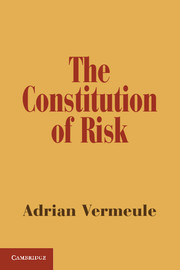1 - Precautionary Constitutionalism
Published online by Cambridge University Press: 05 June 2014
Summary
In the regulation of financial, environmental, health, and safety risks, “precautionary principles” state, in their most stringent form, that new instruments, technologies, and policies should be rejected unless and until they can be shown to be safe. Examples include requirements that new drugs pass stringent tests of safety before they are licensed for sale; requirements that nuclear power plants pass stringent tests of design safety before coming into operation; and the Bush administration’s “one percent” doctrine, which held that even a miniscule risk of terrorism warranted precautionary countermeasures. Such principles come in many shapes and sizes, and with varying degrees of strength, but the common theme is to place the burden of uncertainty on proponents of potentially unsafe technologies and policies. Critics of precautionary principles urge that the status quo itself carries risks, either on the very same margins that concern the advocates of such principles or else on different margins; more generally, the costs of such principles may outweigh the benefits.
Although this debate is a relatively new one in the theory of regulation, it is a venerable one in constitutional law debates about second-order political risks, or so I will claim. At the wholesale level, many theorists defend a master principle according to which constitutions should be designed to take precautions against political risks arising from the design of institutions and the allocation of power among officials. At the retail level, many constitutional rules and structures have been justified as precautions against the risk of abuse of power by incumbent officials or other constitutional actors, the risk of tyrannous majorities, or other political pathologies. Although later chapters will critique precautionary justifications for constitutional rules, the aim of this one is to reconstruct such arguments in charitable terms, in order to put them in their best possible light.
- Type
- Chapter
- Information
- The Constitution of Risk , pp. 27 - 51Publisher: Cambridge University PressPrint publication year: 2013



